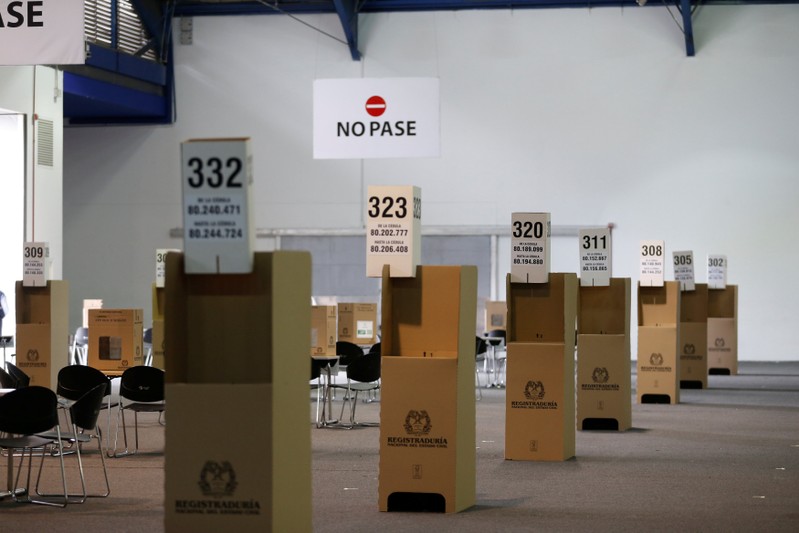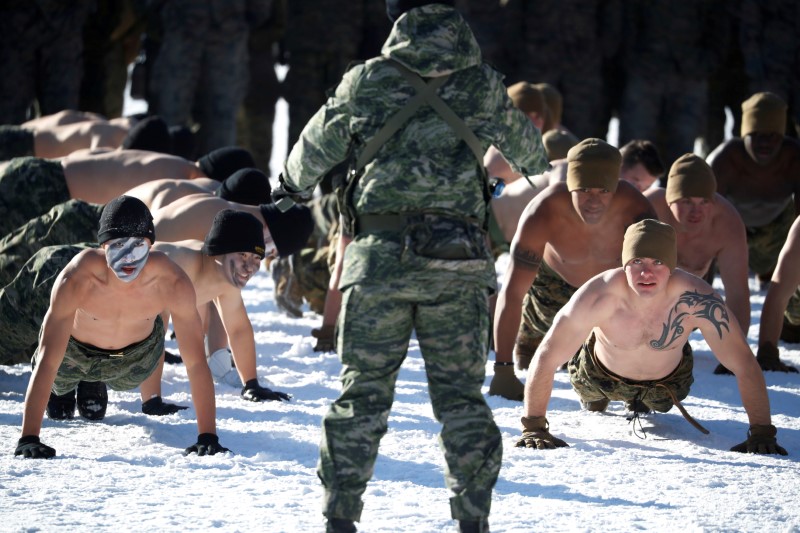
Ballot boxes are seen at an electoral polling station ahead of June 17 second round of presidential election in Bogota, Colombia, June 16, 2018. REUTERS/Luisa Gonzalez
June 17, 2018
By Steven Grattan and Helen Murphy
BOGOTA (Reuters) – Colombians vote on Sunday in a deeply divisive presidential runoff that pits candidates offering polar opposite views and has stirred fears the winner will upset a fragile peace process or derail the economy.
Ivan Duque, the business-friendly protégé of hardline former president Alvaro Uribe, wants to alter a peace deal he deems too lenient on Marxist FARC rebels, while keeping Colombia’s largely orthodox economic model.
His rival, leftist former guerrilla Gustavo Petro, has pledged to take on political elites, redistribute land to the poor and gradually eliminate the need for oil and coal in Latin America’s fourth-largest economy.
“We’re between a rock and a hard place,” said financial planner Juan Jose Mojica, 21. “They’re two extremes that could destroy the development that the country has made over the last years.”
From the sweltering Caribbean coast to the frigid heights of the Andes, some 11,230 polling stations will open at 1300 GMT. Polls close at 2100 GMT and results are expected within hours.
These are the first elections since a 2016 peace deal with the Revolutionary Armed Forces of Colombia (FARC), which ended their part in a five-decade conflict that has killed more than 220,000 people and displaced millions.
Duque wants to change the accord with tougher punishments for FARC war crimes, while Petro promises to support the existing deal and continue a peace process with the National Liberation Army (ELN) – Colombia’s last active rebel group.
“Duque doesn’t want peace. He wants war to continue and prevent Colombia getting ahead,” said Jorge Andres Sanchez, 31, selling World Cup goods in a Bogota shopping center. “Let’s put it behind us and start again.”
A lot is at stake too for Colombia’s $324 billion economy. Duque has promised to keep investors happy by cutting business taxes, bolstering the oil and coal sectors – top exports – and helping manufacturing.
Petro, a one-time member of the now defunct M19 insurgent group, wants a new economic model that ditches reliance on extractive industries for renewable energy and a land reform that promotes an increase in productive use.
His policies have prompted rivals to compare him to Venezuela’s former Socialist President Hugo Chavez.
“The markets and the productive sector see Duque as someone who guarantees the continuity of the current economic model, while they see Petro as someone who would break it down,” said Carlos Sepulveda, dean of economics at Rosario University.
State-run oil company Ecopetrol SA is responsible for almost 60 percent of Colombia’s oil production of around 830,000 barrels per day and operates export pipeline infrastructure.
Petro would shift its emphasis toward wind and solar power.
“I really don’t like either of them, but as I have to choose, it has to be Duque,” said Carlos Mora, a 52-year-old lawyer. “With Petro, I really think we’ll end up like Venezuela.”
Some candidates from the first round have asked Colombians to cast blank ballots – a means for voters’ to demonstrate dissatisfaction with the choice of candidates.
Sergio Fajardo, nudged into third place by Petro last month, said on Friday neither Petro nor Duque represent a good option.
“The blank vote will be higher than usual because the two candidates are from the most extreme positions on right and left, leaving the moderate centrist electorate with no obvious option,” said political analyst Yann Basset.
(Reporting by Steven Grattan and Helen Murphy; Editing by Julia Symmes Cobb and Marguerita Choy)

